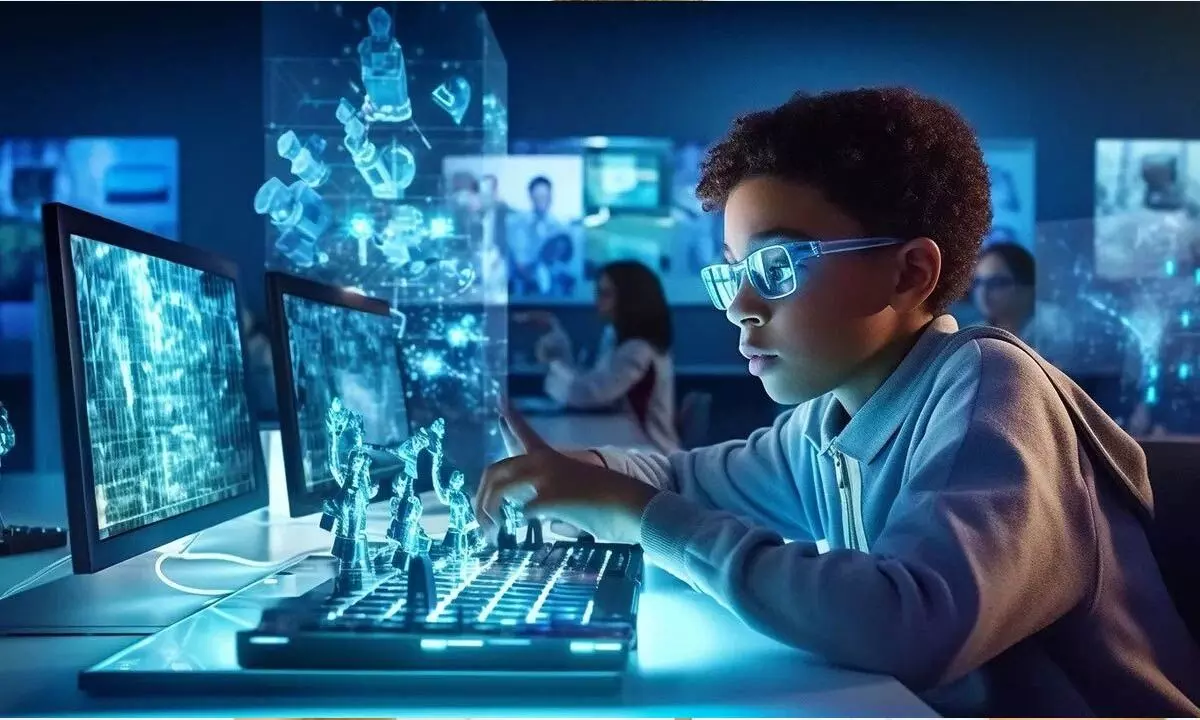How AI will impact the teaching sector

In a strong step forward for the education sector in India, a school in Kerala has introduced IRIS, India’s first generative AI robot teacher
In a strong step forward for the education sector in India, a school in Kerala has introduced IRIS, India’s first generative AI robot teacher. Set to improve and impact India’s learning landscape in ways previously unseen, IRIS pushes the boundaries of what is possible, even beyond education. Here, we explore the impact of AI in the classroom, both for teaching and learning. While AI has the capability to transcend conventional abilities of education, the introduction of it in classrooms marks a new sphere of learning in India.
Personalized Learning
One of the reasons AI has become so popular in the education sphere, is its ability to make personalized learning easy for both students and teachers. We know that each individual student has their capabilities and weaknesses, and by analyzing student data, AI can tailor individual instructional content that works for each student, explaining topics in a way that makes sense to them individually. By focusing on each student individually, AI can boost student learning and empower them to maximize their potential and achieve academic success.
Unrestricted Access
In today’s world where parents and students alike are focused on not only just being academically-inclined, but also focused on crucial soft and social skills , each student may have their own extra-curricular schedule outside of academics. 24 by 7, unrestricted access to educational resources and staff can motivate students to build a schedule that works for them and allows them to exceed the boundaries of traditional space and time.
Augmented Teaching
While there is no doubt that AI helps students, it also helps educators in numerous ways. It is important to note that AI technologies are not replacing human teachers, instead by working collaboratively, AI can help teachers boost their productivity and focus on the more human aspects of teaching like building a rapport with their students and giving them mentorship, and developing their curriculum.
By allowing AI to create lesson plans and grade assignments, educators have more time to dedicate to their own as well as their students’ wellbeing. This collaborative nature can foster a dynamic learning environment that can help educators educate better, and also improve student success outcomes.
Educators are also able to make more informed decisions concerning lessons and students due to AI’s ability to effectively analyze vast amounts of data in a very short time, such as student performance, engagement, and learning patterns.
Ease of Collaboration
Not only does collaboration need to exist between educators and AI technology, but also between educators and students, and even amongst students themselves. Improvements in technology and development in AI has made this collaborative process smoother.
Through virtual classrooms, online forums, and collaborative projects, students are able to connect with their educators and peers alike, even on a global scale. A global and local perspective enriches students’ cultural milieu and knowledge.
Improvement & Innovation
Bringing forth a new moment in India’s educational journey, AI is constantly improving and innovating itself.
Through AI, India can reach far and wide to provide quality education to all its children, even in underserved and often-forgotten parts of the country. AI can help reduce inequalities in access to quality education, ensuring that each child is able to receive the education they deserve and need to thrive, regardless of age, class, caste, and gender.
AI will continue to grow and become more sophisticated, and with it, its abilities will also improve with time. Innovation, experimentation, and collaboration are the keywords that educators and students must embrace to make AI a part of the day-to-day learning environment at educational institutes. AI plays its own part to ease the efforts of the educator as well as the student.
From making better decisions, efficiently allocating time and resources, and shaping the future of education for educators, to empowering students to study more effectively, and giving them the space to grow and thrive on their own.
As AI technology grows and evolves, new technologies like IRIS can be expected to spread through the country. However, we must also remember to prioritize ethical considerations when using AI to protect and uphold privacy, transparency, and inclusivity. AI is a transformative technology for students and teachers alike, and can help make life easy and drive innovation for the educational sector and beyond.
(The author is Dean Management & Director AIMSR)








